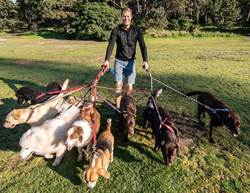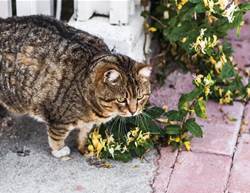While many conventional doctors discourage clients from feeding dogs and cats "people food," I believe fresh organic food contributes to improved health in my patients. There are many foods that are easy to grow, appeal to most pets, and provide health benefits. While this applies to both cats and dogs, many cats do not seem to relish produce as much as dogs, but it's worth experimenting.
Fruits and vegetables are generally low in kilojoules, which means they make great treats for pets on a diet. As for how much to feed a pet, I don't suggest a particular amount, as long as the vegetables or fruits make up no more than 20-25% of a dog's diet (if you are feeding a processed natural food) or 40-50% of a natural homemade diet.
While vegetables can be consumed raw, steaming or sautéing are better alternatives. Spice things up with salt, pepper, turmeric, lemon or just about any seasoning you like. There are exceptions, however—see "Foods to Avoid" below.
(Want to pick up some healthier habits? Sign up for FREE to get healthy living tips, weight loss inspiration, slimming recipes and more delivered straight to your inbox!)
Carrots
Most dogs like carrots, either whole or cut into pieces. The tops of carrots can be fed whole to pet rabbits and rodents, or chopped fine and used as a topping on dog food. One compound found in carrots, falcarinol, has anticancer properties; another, beta-carotene, promotes healthy vision and also functions as an antioxidant to fight free radical cell damage. Carrots may also reduce the risk of heart disease.
Beans
Many owners give their dogs varieties of green or string beans. Bean pods (including the seeds) can be used whole or cut into small pieces. Health benefits of green beans may include decreased blood cholesterol and glucose levels, because of their fiber content; and improved heart health, due to their antioxidant, folic acid, and vitamin B6 content.
Broccoli
Broccoli is one of my favourite recommendations to pet owners, especially for pets with disorders of the immune system, including cancer. Broccoli contains indole-3-carbinol and sulforaphane, compounds that help control cancer by promoting "good" hormone levels (especially oestrogen levels) and increasing the level of enzymes that help prevent cancer formation.
Dark Leafy Greens
Any dark green leafy vegetable is good for pets. Some dogs will eat the greens after they are cooked. Steam, sauté or blend an assortment with water or organic meat broth and pour it on the pet's food. High levels of antioxidants in greens help prevent increased oxidation and cell damage, which can be responsible for cancer, and chronic inflammatory diseases such as arthritis.
Dark-Coloured Berries
I think of fruit as more of a dessert than a main ingredient; therefore, I recommend no more than 10-15% of the diet contain healthy organic berries. Health benefits of berries are due to their high antioxidant content. Berries, especially blue-berries and blackberries, are helpful in fighting any disease in which oxidative stress and inflammation play a role, including arthritis, allergies and cancer.
Foods To Avoid
While most pets can eat pretty much anything you grow, there are some things to avoid due to potential toxicity. Cats and small dogs are sensitive to some of the chemicals in onions and garlic, as these foods can cause red blood cell damage leading to anemia. All pets should avoid onions. Garlic has many health benefits (antibacterial, anti-blood clotting, immune system support), and I like my patients to have small amounts if their owners desire. I recommend one small clove per 5-11kgs of body weight per day. Regular blood testing (every three to six months) can detect anemia, which is unlikely at this dosage. Grapes and raisins can cause kidney failure in dogs and should be avoided.
This article contains the personal opinions of the author and is not intended to provide veterinary guidance. Consult your veterinarian regarding your pet's specific health needs.
The article originally appeared on Rodale's Organic Life.










